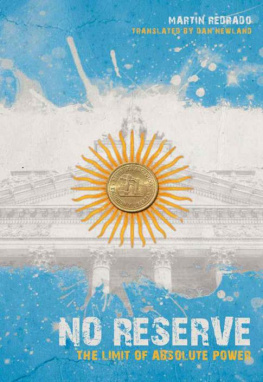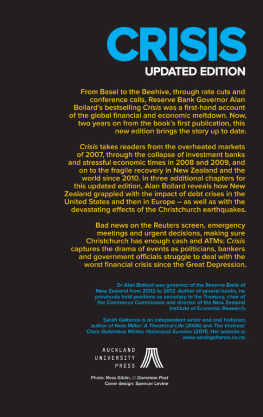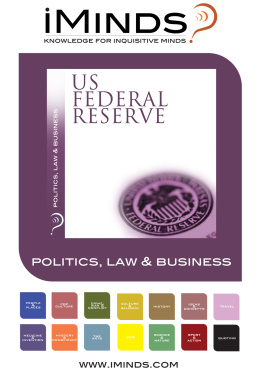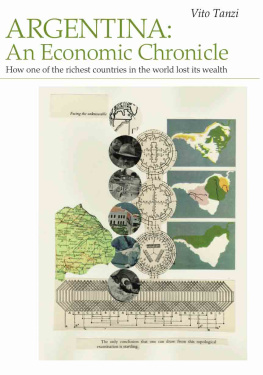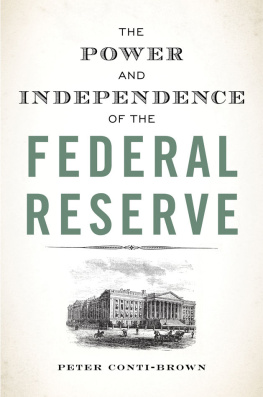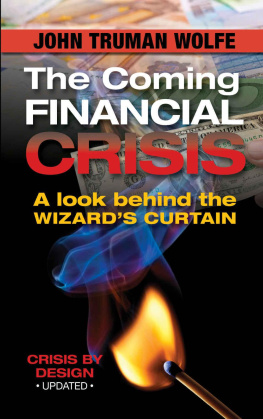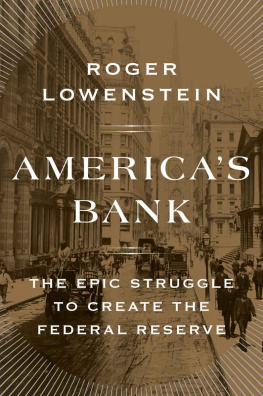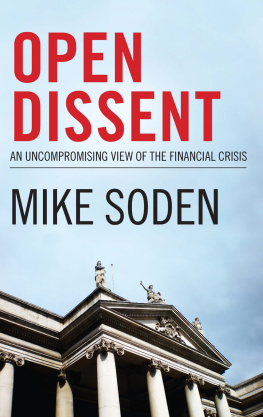NO RESERVE
The Limit of Absolute Power
Martn Redrado
Translated by Dan Newland

Text copyright 2010 Martn Redrado
English translation copyright 2011 by Amazon Content Services LLC
All rights reserved.
No part of this book may be reproduced, or stored in a retrieval system, or transmitted in any form or by any means, electronic, mechanical, photocopying, recording, or otherwise, without express written permission of the publisher.
No Reserve: The Limit of Absolute Power was first published in 2010 by Editorial Planeta as Sin Reservas: Un lmite al poder absoluto .
Translated from Spanish by Dan Newland.
First published in English in 2011 by AmazonCrossing.
Published by AmazonCrossing
P.O. Box 400818
Las Vegas, NV 89140
ISBN: 978-1-935597-23-0
Table of Contents
Prologue
I have no doubt that emerging countries will play a leading role in the decades to come. The kickoff provided by China when it opened its doors to the world, in just a short time becoming a major world power; the veritable explosion of world-class new technologies that India is producing; Brazils economic growth with social inclusion, which has garnered it the kind of worldwide recognition to permit it to host the 2016 Olympic Games, becoming the first South American country ever to do so; these are but a few examples of the leading roles that emerging countries are taking on.
Furthermore, the 2008 world crisis has placed emerging countries in a privileged position. While the United States, Europe, and Japan are still suffering the collapse of credit, industry and employment, developing nations in Asia and South America present a sound growth rate and have become attractive places in which to invest.
Be that as it may, the question that arises when one tries to gain deeper knowledge of these countries is how do their governments behave? How do those at the highest levels of power act? No Reserve: The Limit of Absolute Power is a book that provides insight into this little-explored question. It offers the reader the possibility to understand how decisions are made at an executive power level in emerging countries.
I directed the Central Bank of Argentina for five years and four months. During that period, I came to know firsthand how the Executive Branch, which is still in the same hands today as then, pulls the strings of power in one of the emerging countries of greatest potential in South America.
Supported by previously unpublished documents, this book reproduces the dialogs that I had with the highest authorities in my country, and provides a chronology of the crisis that was unleashed when an attempt was made to devise a new role for the international reserves of the Central Bank, on the strength of an executive decree and in conflict with the law. No Reserve is a first-person narrative that tells precisely what happened in key spots where decisions are made that affect the destiny of an entire society.
This story provides a look at the web of power in Argentina from an insiders point of view. In fact, I wrote these pages while I was still in office. This is why No Reserve offers readers something about emerging countries that cannot be found elsewhere. It demonstrates a clear example of a nation that could rank among the most important in the world, but that, when it comes to increasing its development, finds itself immersed in difficulties, due to certain attitudes taken by those who govern it.
It has only been in the past twenty-five years that emerging countries in the South American regionincluding Argentinainitiated the road to democracy, following decades of military coups, crimes, prohibitions, and even the disappearances of individuals. But today, in Argentina as in neighboring countries, the elections of governing officials and members of Congress are held without any major disturbances or threats.
Despite the importance of this fact, Argentinas institutions still show certain weaknesses. Currently in this country, republican checks and balances are frequently undermined by the eagerness of one power to advance on the institutional territory of another.
At the end of last year, the Central Bank, which, during my term, functioned as an institution with independence of criteria but did so while taking an active role in attending the countrys current problems, became the victim of such abusive and improvised attitudes.
Readers will also find the complete story of the work that my team and I carried out during these years at the head of the Central Bank and of how, as a result of the measures taken by the institution, the country managed, from 2008 on, to steer clear of one of the worst global crises in the history of modern capitalism.
While several of the worlds leading countries succumbed to bank closures, plummeting stock markets and high unemployment rates, and while, still today, others are facing tough situations, as in the cases of Greece, Ireland, Portugal, and Spain, Argentina came through the crisis practically unscathed, thanks to a series of economic measures implemented by the Central Bank under my direction.
At the beginning of this century, my country lived through one of the worst economic and social crises in its history. In 2002, however, Argentina managed to leave intensive therapy and take the road to a process of growth.
Argentina learned its lesson, and while in 2000 and 2001 we provided an example to the world of what should not be done, in this new era of worldwide upheaval, we have become an example to be followed. In these pages, readers can also find a description of the mechanisms that we employed in successfully facing up to this grave crisis.
Additionally in No Reserve , I provide an outline of my vision for Argentina in the years to come, as an example of the good fortune that could well await emerging nations, if they do what they should. I also present an agenda for sustainable growth.
In this sense, this book can be considered an opportunity to observe the strengths, weaknesses, and present scenario displayed by an emerging region that promises to play a more leading role in the years to come, within the complex framework of the world economy.
Chapter 1
The Beginning of the End
December 14, 2009, was a really nice day, with a temperature of sixty-two degrees Fahrenheit. I got up feeling great. I had spent the weekend with my family, talking about the upcoming summer vacation time. After a year that had started out so rocky as a result of the world economic crisis, all indications were that we could expect 2009 to close as calm as the waters of a garden pond.
We still hadnt figured out where we would go that summer. But it didnt matter. It was nine months before the end of my term as President of the Central Bank. I had the satisfaction of knowing I was going to conclude a period of transition for the Argentine economy (20042010), after the collapse produced by the default on its public debt without any big scares. During these years we had established the pillars for a monetary, foreign exchange, and financial policy for the decades to come. This was a major legacy given our history of economic instability.
Reading the news confirmed my peace of mind, although this was overshadowed by one sad note: The great academician, Paul Samuelsonthe first American ever to receive the Nobel Prize for Economics (in 1970)had died. His death took me back to my earliest days at the University of Buenos Aires, since the first book I asked for at the library was by that renowned economist.

